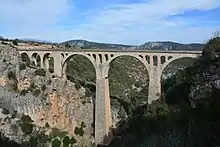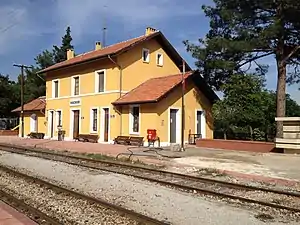Hacıkırı railway station
Hacıkırı railway station (Turkish: Hacıkırı istasyonu) is a railway station in the village of Kiralan, Adana in Turkey. The station is the southern entrance to the Çakıt Valley pass, where the railway traverses through 12 tunnels, the longest of them being 3.7 km (2.3 mi) long.[1] South of the station lies the well-known Varda Viaduct.

HACIKIRI | |||||||||||||||
|---|---|---|---|---|---|---|---|---|---|---|---|---|---|---|---|
| TCDD Taşımacılık intercity rail station | |||||||||||||||
 Hacıkırı railway station | |||||||||||||||
| General information | |||||||||||||||
| Location | Kiralan Köyü 01770 Karaisali, Adana Turkey | ||||||||||||||
| Coordinates | 37.2522°N 34.9810°E | ||||||||||||||
| Owned by | Turkish State Railways | ||||||||||||||
| Operated by | TCDD Taşımacılık | ||||||||||||||
| Line(s) | Konya-Yenice railway | ||||||||||||||
| Platforms | 1 island platform | ||||||||||||||
| Tracks | 2 | ||||||||||||||
| Construction | |||||||||||||||
| Structure type | At-grade | ||||||||||||||
| Parking | Yes | ||||||||||||||
| History | |||||||||||||||
| Opened | 11 October 1918 | ||||||||||||||
| Services | |||||||||||||||
| |||||||||||||||
Hacıkırı station was originally constructed in 1912 by the Baghdad Railway and remained the northern terminus of the southern half of the railway (the northern half being across the Çakıt Valley). The station played an important role during World War I, where troops and material coming from the north would board trains at Hacıkırı, after traversing a 17 km (11 mi) gap in the railway. The tunnels between Hacıkırı and Belemedik were finally completed in September 1918 and the station officially opened on 9 October, 11 days before the Ottoman Empire capitulated.[2]
Hacıkırı station consists of an island platform serving two tracks, with three more tracks used as sidings.
TCDD Taşımacılık operates two daily intercity trains from Konya[3] and Kayseri[4] to Adana.
References
- "Tunnels". trainsofturkey.com. Retrieved 10 April 2018.
- "CIOB - Chemin de Fer Impérial Ottoman de Baghdad". trainsofturkey.com. Retrieved 10 April 2018.
- "Toros Ekspresi". tcddseferleri.com (in Turkish). Retrieved 10 April 2018.
- "Erciyes Ekspresi". tcddseferleri.com (in Turkish). Retrieved 10 April 2018.